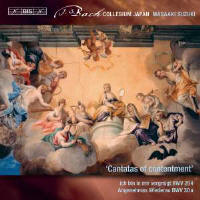Texte paru dans: / Appeared in: |
|
|
Outil de traduction ~ (Très approximatif) |
|
|
Reviewer: Jerry
Dubins
This is the 10th and final
volume in Masaaki Suzuki’s survey of Bach’s secular cantatas. If you’ve
collected one or more of the previous releases, you’ll know what to expect.
I’ve reviewed a number of those earlier volumes and have expressed my likes
and dislikes about them. Mostly, I think, the latter has outweighed the
former.
My main dislike is largely
personal and subjective, and may therefore be ignored if you’re not of
similar mind. The substitution of a countertenor (in this case, Robin Blaze)
for a female alto is not to my taste. There may be a place for the
countertenor in music history, but it’s assuredly not in Bach. Moreover, if
the rationalization for using a countertenor in Bach’s 18th-century German
choral tradition is that female vocalists were verboten, and that only men
and boys were allowed, then what is the rationalization for using a female
soprano soloist (in this case, Carolyn Sampson) and female sopranos and
altos in the choir? One final point on this matter: These are Bach’s secular
cantatas. Even if the case can be made that only men and boys sang in the
composer’s church cantatas, it’s hard to imagine that Bach wouldn’t have
employed female singers for these non-church works, some of which, like the
“Coffee” Cantata, were written purely for entertainment purposes. Can you
visualize the part of the rebellious, coffee-guzzling daughter being sung by
a 10-year-old boy?
A second dislike I’ve
mentioned in reviewing prior albums in this series has been the stray out of
tune and sour note emanating from the period instrument orchestra. But these
are few and far between. On the whole, Suzuki’s Bach’s Collegium Japan
instrumentalists are well-tempered. “I am content in myself, May someone else indulge in fancies, But thereby he will not Fill his bag, nor his stomach.” “I’m not boasting about myself, A fool shakes his bells; I just remain still, Timid dogs bark.” “My passion is To control my passion; I fear no distress,
Do not ask after pointless
things.”
You get the picture—just
biding one’s time in God’s waiting room. Were it not for the fact that Bach
chose to exercise his own passion and provide this Weltschmerz-like
text with music that is very much alive to the promise of industry and
achievement, this cantata could have ended up on suicide watch. But in an
aria like “Die Schätzbarkeit der weiten Erden,” so beautifully sung by
soprano Carolyn Sampson, Bach manages to endow the words of the living dead
with music of life-giving force. As was his custom, Bach once again made
good, and in this case, better, use of the music he’d composed for BWV 204,
when only a year later he recycled some of it for Vergnügte PleißenStadt,
BWV 216.1 (formerly BWV 216), a cantata for the wedding of Johann Heinrich
Wolff and Susanna Regina Hempel. Done with Bach’s sacred and secular cantatas, and having recorded the composer’s Mass in B Minor and Magnificat, the St. John and St. Matthew Passions, the Missae breves, the motets, the Christmas and Easter Oratorios, and a dozen other smaller stand-alone sacred choral works, Suzuki would seem to have exhausted Bach’s contributions to that body of work. But as a keyboard artist and orchestral conductor, Suzuki has also given us Bach’s harpsichord concertos and practically the entirety of the composer’s solo keyboard output (suites, partitas, Goldberg Variations, WTC I and II, etc.); and as conductor, he has led his Bach Collegium Japan in the orchestral overtures (aka, suites). I think it’s fair to say that Suzuki’s Bach will be an enduring legacy for the ages. As I’ve made clear, I don’t necessarily agree with every one of Suzuki’s artistic/interpretive decisions, and there are other performances of these secular cantatas I prefer, namely those by Helmuth Rilling and the Stuttgart Bach Collegium, but Suzuki’s conclusion of this secular cantata survey is to be applauded and appreciated. If you collected the previous nine volumes, you obviously cannot be without this one to complete the set. | |
|
|
|
|
Cliquez l'un ou l'autre
bouton pour découvrir bien d'autres critiques de CD |
|




